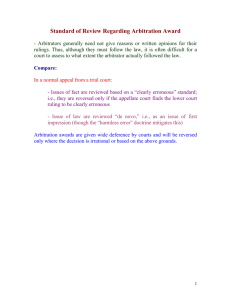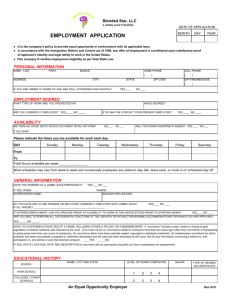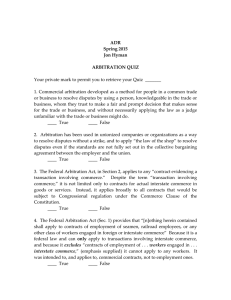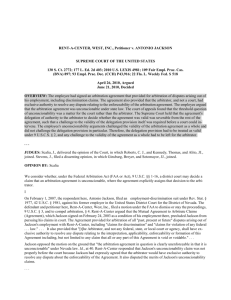Interpersonal Behavior at Work: Definitions
advertisement
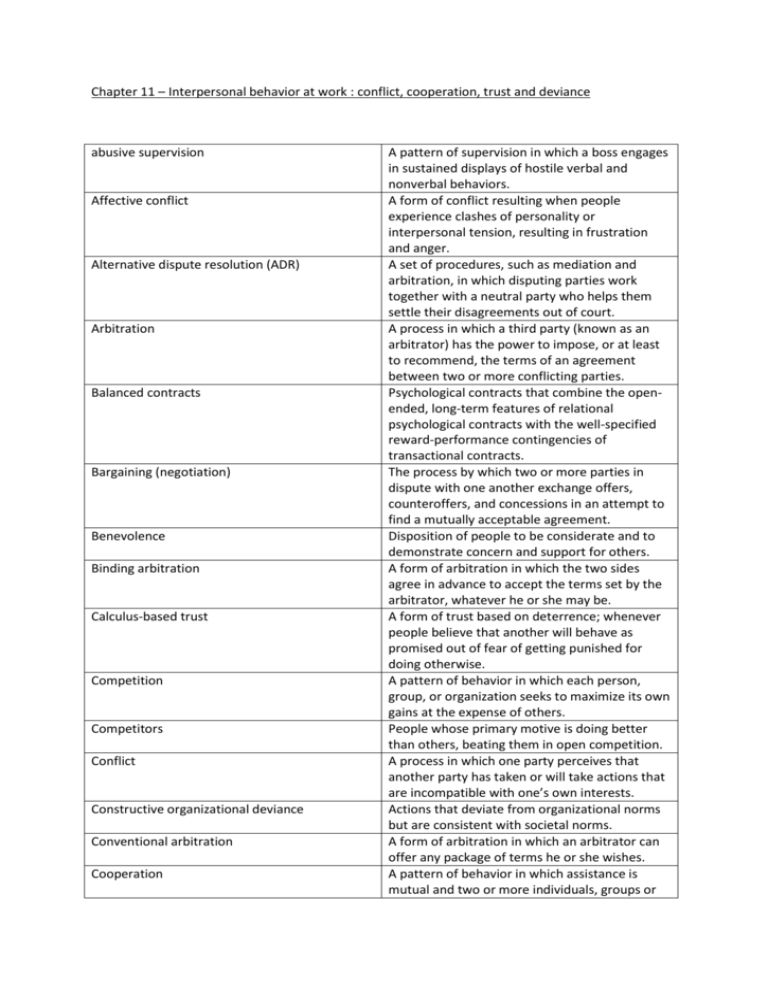
Chapter 11 – Interpersonal behavior at work : conflict, cooperation, trust and deviance abusive supervision Affective conflict Alternative dispute resolution (ADR) Arbitration Balanced contracts Bargaining (negotiation) Benevolence Binding arbitration Calculus-based trust Competition Competitors Conflict Constructive organizational deviance Conventional arbitration Cooperation A pattern of supervision in which a boss engages in sustained displays of hostile verbal and nonverbal behaviors. A form of conflict resulting when people experience clashes of personality or interpersonal tension, resulting in frustration and anger. A set of procedures, such as mediation and arbitration, in which disputing parties work together with a neutral party who helps them settle their disagreements out of court. A process in which a third party (known as an arbitrator) has the power to impose, or at least to recommend, the terms of an agreement between two or more conflicting parties. Psychological contracts that combine the openended, long-term features of relational psychological contracts with the well-specified reward-performance contingencies of transactional contracts. The process by which two or more parties in dispute with one another exchange offers, counteroffers, and concessions in an attempt to find a mutually acceptable agreement. Disposition of people to be considerate and to demonstrate concern and support for others. A form of arbitration in which the two sides agree in advance to accept the terms set by the arbitrator, whatever he or she may be. A form of trust based on deterrence; whenever people believe that another will behave as promised out of fear of getting punished for doing otherwise. A pattern of behavior in which each person, group, or organization seeks to maximize its own gains at the expense of others. People whose primary motive is doing better than others, beating them in open competition. A process in which one party perceives that another party has taken or will take actions that are incompatible with one’s own interests. Actions that deviate from organizational norms but are consistent with societal norms. A form of arbitration in which an arbitrator can offer any package of terms he or she wishes. A pattern of behavior in which assistance is mutual and two or more individuals, groups or Cooperators Core task behavior (CTB) cyberloafing Destructive criticism Destructive organizational deviance Deviant organizational behavior employee theft Equalizers Final-offer arbitration Identifications-based trust Identification-based trust incivility Individualists Integrative agreement Interpersonal behavior Mediation Mixed motives obstructionism OCB-I organizations work together toward shared goals for their mutual benefit. people who are concerned with maximizing joint outcomes, getting as much as possible for their team. Formal behaviors that traditionally are recognized as part of a particular job. The practice of using a company’s e-mail and/or Internet facilities for personal use. Negative feedback that angers the recipient instead of helping him or her do a better job. A form of behavior that violates both organizational and societal norms. Actions on the part of employees that intentionally violate the norms of organizations and/or the formal rules of society, resulting in negative consequences. The taking of company property for personal use. People who are primarily interested in minimizing the differences between themselves and others. A form of arbitration in which the arbitrator chooses between final offers made by the disputing parties themselves. A form of trust based on accepting the wants and desires of another person. Demonstrating a lack of regard for others, denying them the respect they are due. People who care almost exclusively about maximizing their own gain and don’t care whether others do better or worse than themselves. a type of solution to a conflict situation in which the parties consider joint benefits that go beyond a simple compromise. A variety of behaviors involving the ways in which people work with and against one another. The process in which a neutral party (known as a mediator) works together with two or more parties sides to reach a settlement to their conflict. Contexts in which people have reasons both to cooperate and to compete. Attempts to impede another’s job performance. Acts of organizational citizenship directed at other individuals in the workplace (i.e. helping coworkers in ways that go beyond what is expected). OCB-O Organizational citizenship behavior (OCB) overt aggression Process conflict Prosocial behavior Psychological contract Reciprocity Relational contract Social dilemma Substantive conflict Swift trust Transactional contract Trust Voluntary arbitration Whistle-blowing Win-win solutions workplace aggression workplace bullying Acts of organizational citizenship directed at the organization itself (i.e. helping the company in ways that go beyond what is expected). An informal form of behavior in which people go beyond what is formally expected of them to contribute to the well-being of their organization and those in it. Acts that are outwardly intended to harm other people or organizations. A form of conflict resulting from differences of opinion regarding how work groups are going to operate, such as how various duties and resources will be allocated and with whom various responsibilities will reside. The tendency for people to help others on the job, even when they will not personally benefit from assisting. A person’s beliefs about what is expected of another in a relationship. The tendency to treat others as they have treated us. A variety of psychological contract in which the parties have a long-term and widely defined relationship with a vast focus. Situations in which each person can increase his or her individual gains by acting in a purely selfish manner, but if others also act selfishly, the outcomes experienced by all are reduced. A form of conflict that occurs when people have different viewpoints and opinions with respect to a decision they are making with others. Trust that occurs as a set of collective perceptions develops among members of temporary groups. A variety of psychological contract in which the parties have a brief and narrowly defined relationship that is primarily economic in focus. A person’s degree of confidence in the words and actions of another. A form of arbitration in which the two sides retain the freedom to reject the agreement recommended by an arbitrator. The disclosure by employees of illegal, immoral or illegitimate practices by employers to people or organizations able to take action. Resolutions to conflicts in which both parties get what they want. Acts of verbal and physical abuse toward others in organizations, ranging from mild to severe. The repeated mistreatment of an individual at work in a manner that endangers his or her physical or mental health.
